- Home
- Kristen Simmons
Pacifica Page 7
Pacifica Read online
Page 7
And then, “In here! Hey! Hey!”
They’d found the girl.
Acid burned up Ross’s throat.
They shoved through a door, into the chaos of the riots.
“Move, move, move!” Tersley ordered. Ross’s feet couldn’t keep up. He nearly fell into his bodyguard. He could hear Adam behind him—the clack of his shoes on the concrete sidewalk. And then suddenly, all he wanted to do was run. He wanted out. He hauled faster, and faster, bumping again into Tersley as he plowed onward. His breath came in shallow pulls. Dread gripped his spine.
The girl was dead.
Dead.
Dark shadows danced in a pulse of orange flames from the bonfire. There was a car parked ahead against the curb that he recognized. Shorelings surrounded it, wearing baggy, tattered clothes. A man with glasses held a bat, and as Ross watched, he swung back and knocked through the rear window. Glass shattered on the ground.
“What happened in there?” he called. “You hurt that girl?”
A dozen voices raised in question—about the girl, about what they’d done. They knew. They already knew.
“Back off!” shouted Tersley. The man saw the gun and jumped back, just far enough to clear a path. Against Ross’s better judgment, they raced toward it, bumping into each other, stumbling. Reaching the back door of the car.
“Inside.” Tersley hauled it open, pushing Adam, who was closer, inside, then Ross, and then jumping in himself. It was a tight fit. Adam wasn’t huge, but Tersley was enormous, and Ross’s knees were crammed against the console in front of him, pinning him in place.
The engine was already humming, and their driver, keeping low in his seat, inched forward.
“Drive!” Tersley snapped. “Get us out of here.”
“I can’t,” said the driver. The front window was already cracked. One of the solar panels from the roof had come loose and slid forward, hanging at an angle in the center of their vision.
Before them, a dozen or more Shorelings blocked the street. They carried torches. Flames licked the night.
Those nearby closed in again, slapping their hands on the roof of the car, on the windows, trying the door handles. Adam’s side was locked, but he still pushed away from the door like it might give. Ross was forced forward between them.
“Run them over,” Tersley said.
“Shit,” said Ross. “Shit.”
The tires squealed as the driver accelerated.
“Move out of the way!” Adam shouted.
Ross glanced over to the door, seeing now that it wasn’t fully closed. Tersley tried to slam it, but it wouldn’t hold. Something was wrong with it. Outside, the broken pavement crunched under the tires. Bodies bumped against the car—nothing under the tires, nothing that seemed hard enough to cause damage—but the very idea of it still made Ross sick.
“Get out of the car!” someone shouted.
They hit a corner and people outside jumped out of the way. Everyone slid into Adam, smashing him against the door.
“You stupid trawler bastard,” Tersley growled, showing an anger Ross had never seen in him before. “This was your idea, wasn’t it?”
“What?” Adam balked. “What? No.”
“I came as soon as your tracker came back online,” said Tersley. “I should toss you out where you belong.”
Adam squeezed closer to Ross’s side.
Outside, the buildings whipped by. It suddenly occurred to Ross that there were no other patrolmen around. Tersley hadn’t brought anyone. There wasn’t a search, like he’d considered a dozen times throughout the night. Or if there was, they weren’t here.
Up ahead was a blockade of some kind. The driver muttered something he couldn’t make out. Ross squinted through the night, then shoved back against the seat when he realized what lay before them. His feet pressed against the floor of the car, hard, as if this might slow them down.
A mass of people, so close they seemed interconnected, spilled down the middle of the street, covering the sidewalks on either side. The lights here were out, and only the occasional torch and the beams of the car’s headlights lit their way.
“Where are the patrolmen?” Adam asked. “They were shutting down the riots. Everyone was supposed to go home.”
Tersley raised his wristband comm to his mouth.
“Calling in for backup. Seventh and Sierra. I’ve got the president’s son. I—” He tapped the comm. Swore. Ross glanced at it. It wasn’t even lighting up. He remembered the people in Hiro’s shop. It must have broken when Tersley was pushing through them.
The crowd saw them. A few people splintered away, heading in their direction. Then a few more. They moved faster.
The driver slammed on the brakes. His arm reached over the passenger seat as he turned back to face them, throwing the car into reverse. Ross blinked at his face—his stern brows, and scruffy skin, cracked and wrinkled around his eyes, and the arcs at the corners of his mouth. He’d never looked at the man’s face before. He didn’t even know his name. And now Ross’s life was in his hands.
People in the crowd were running toward the car. More were coming from a nearby brick building. They seemed to come from everywhere.
The car slowed. Tersley shouted at the driver to keep moving. The driver shouted back. Ross heard only a buzzing in his ears. Only his own fast, sharp breaths.
He looked at Adam. The whites of his eyes shone around the brown irises.
My fault. My fault. My fault.
Voices outside called to them. What’re they doing? And Hey, they’ve got kids in there!
Then, Get them out! Get those kids out!
A crack on the front window. Ross’s neck craned forward. Someone was hitting the glass—the bulletproof, UV-protected glass. It broke across the center, a long crack that veined like a lightning strike. Another crack and it bowed in, groaning, weakening around the edges.
“Back seat!” he heard someone yell.
They were coming for him. The fear swelled inside him and burst. He slammed his hand against the seat in front of him.
“Go!” he shouted at the driver.
“Get us back to the district!” Tersley roared over the shouts of the crowd.
An instant later Adam’s window was hit. He yelled out, terror ripe in his voice, and blocked his face from the bowing glass. Again, it was hit, and this time the blunt end of a metal bat broke through. Glass shards exploded across the seat. Hands reached inside, blindly grabbing, reaching, clawing. Tersley’s arm locked around Ross’s chest.
The angry voices overlapped and blended together.
They’re taking our kids now?
Where you think you’re going?
Get them out of there!
Kanshu, they said. He heard it a dozen times or more. Kanshu, kanshu, kanshu.
Adam scrambled back against them, but it was too late. The door was yanked open, and then ripped back with a squeal of metal.
“Get them out!” someone yelled.
“No!” Ross reached for his friend, fingers slipping over his sweat-slicked arms.
Adam disappeared outside, swallowed by the crowd in a blur of hands and fire and ripped clothing.
“Adam!” Ross pulled free of Tersley’s grip and dove after him, nearly spilling into the asphalt. Someone grabbed his shirt. His hair. Then Tersley was yanking him back across the seat.
“Adam!” Ross called again. He couldn’t see him.
Something thunked against the back of the car. Hands slapped against the doors, the roof, the front hood. The crowd pressed inward, and as the car lurched forward, Adam’s door slammed shut and locked with an audible click. Then they were driving, and the crowd was melting away, unable to keep up. Somehow they’d gotten through it. The quiet hum of the accelerator was accented by the high wail of a siren behind them.
“Wait,” said Ross. “Adam. Where … What are you … We have to go back. What are you doing?” He slammed one hand against the back of the seat. It was numb. His whole arm was n
umb.
The driver didn’t speak, didn’t look back. Ross couldn’t even see his face, just the sweaty hair that stuck out of the bottom of his cap. He turned the car around quickly in the middle of an abandoned street and sped on again.
“Listen to me!” Ross shouted. “He’s back there! He fell out!” He worked at the lock on the door, but it wouldn’t open. The driver must have controlled it.
“He knows,” said Tersley. With one hand he held on to the passenger-side door, now bouncing against the side of the car, unable to close. Ross tried to climb over him, but Tersley shoved him back. He pointed a finger in Ross’s face, but said nothing.
“We have to go back!” Ross stared through the back window in horror as the docks disappeared behind them. “We have to go back. We have to go back.”
He said it as they careened up the twisted hill, past the old visitor center. As they sped through the Plaza Centro. As they entered the political district and finally, as they pulled in front of a massive white stone building, beside the thick pillars that ran the length of a circular overhang. Ross blinked at the wings that fanned out on either side, proud and solid, lined with glass windows. At this place of royalty that had for the last seven years been his home.
Then he spilled out the side door, and collapsed on the smooth black drive, sick, bleeding, and broken.
CHAPTER 9
ON THE morning of her ninth birthday, Marin woke up before dawn and plodded down the attic steps into the community kitchen, where the generator was already humming and the lights inside were bright. Her mother, a hard but handsome woman with a wiry frame and a nest of black curly hair, was behind a low trash-burning stove, apron spattered with oil, stirring a cauldron big enough for a grown man to hide in.
“Hungry?” she asked, without looking up.
Marin nodded, but it was nerves that gnawed at her stomach, not hunger.
Seema wiped her hands on her apron and crossed to one of her polished driftwood counters, where a small, dinged-up lantern waited. Picking it up, she carried it to Marin, who sat on a stool at the opposite end of the kitchen, away from the heat, and began to take it apart with the tools she’d brought in her pockets.
Her mother didn’t return immediately to the stove like she normally did. She stood over her daughter, watching, and as the moments passed, Marin’s palms grew damp and her hands clumsy. She unscrewed the casing, cleaned it with her shirt, then squinted at the circuit and the rusty wires, trying to figure out how it worked.
After a while, Seema said, “You’re getting faster. I’ll have to choose something harder next time.”
Marin deliberately slowed down. She despised these tests. At four, Seema had thrown her off a dock, forcing her to learn how to swim. When she was seven, Marin had been shut out of their home, made to build a shelter out of trash and face a storm alone. Six months ago, her mother had started bringing her machines—little things she picked up in the gomi fields—and told her she couldn’t eat until she found a way to make them work. Sometimes they took hours. Sometimes days.
She’d started waking earlier just so there’d be some food left by the time she finished her mother’s games.
Using wire cutters, Marin stripped, trimmed, and reattached the circuit. Despite her intent to take her time, she felt an overwhelming desire to fix this broken thing. To make it whole again.
“Next you’ll build a boat, I think,” Seema said.
Marin looked up at her, seeing the quick brown eyes, and the pointed nose they shared. Marin’s lips were fuller, though, like her father’s, and up until just then she’d always wished she’d resembled him more.
She said nothing, wondering if this, too, was a test. Her father was the sailor—as far as Marin knew, her mother had never been off the island, even for the day. It was her father who took her to the mainland, to the black-market trader named Gloria, and told her about the South American Federation freighters he’d hijacked alongside the coast of Chile. Her father who taught her to tie knots and trim sails. Her father who held her when the thunder shook their house and the wind lifted the roof.
Her father who said he loved her more than pineapple, and stars, and the open sea.
Her mother retuned to the cauldron, now steaming and smelling of rice.
“You don’t like me,” she said. “That’s okay. You will not be stuck here forever, mouette. One day you’ll fly away from this place; you just need to stretch your wings.”
It was this Marin thought of while she was stuck in the in-between place, waiting to die.
CHAPTER 10
ROSS FOUND himself standing in the foyer of his house, filthy and raw, unsure how he made the trip from the car through the front door. There had been something about the driver talking to the head of security, something about reporting what had happened. Ross didn’t know if he’d responded.
He stared at the hall that led to the south wing of the compound, where the Baker family lived. Where Adam’s parents might be right now, waiting for their son.
A hand on his arm made him jump. When he turned, Tersley was before him, his dirty suit jacket ripped through on one shoulder, revealing a wedge of white beneath.
“We have to go back,” said Ross. His voice was so thin in this huge room, barely bouncing off the cold black tile and the stark white walls. He turned toward the stairs, intending to go to his bedroom to get something, but didn’t even know what he’d need. A weapon of some sort? A comm?
“You’re not going anywhere.” Tersley was halfway turned toward the front door, as if he was stuck between staying and leaving.
“You don’t get to tell me shit anymore.” Ross stalked toward his bodyguard, fury vibrating through every muscle. “You shot that girl.”
Tersley didn’t look away. He slowly faced Ross, a crumbling mountain, hunched against the weight of the night.
“I did my job.” He inhaled. “I only stunned her.”
“You…” She was alive. The breath tumbled out of his lungs, but relief did not come. “She’ll be okay.”
His face was grave. “It was a high setting. One I’m authorized to use for your protection.”
“High setting?” Ross’s stomach twisted. “What does that mean?”
Tersley didn’t answer, which crushed all but a sliver of hope. A girl was injured somewhere, maybe in need of medical care, all because of him.
He fought the urge to punch his bodyguard in the throat.
“You let Adam go.” Ross’s voice broke over the name. Vivid scenes played in his head—Adam hurt, dead, beaten and bloody on the dirty pavement. Those people, wild and crazed, taking him. Taking the kids they’d seen in the car. They didn’t understand. They were out of control, and dangerous.
“I made a choice,” said Tersley.
Ross fell back a step. A choice. Him or Adam. The president’s son, or the trawler bastard.
“It wasn’t a very hard choice, was it?” he said.
Tersley flinched.
“Find me a new car,” said Ross. “We’re going back. And after we find them, I never want to see you again.”
Lines arced around Tersley’s mouth.
“You go back there, they’ll tear you apart. You won’t find either of them. You’ll get yourself killed.”
“I don’t care.”
“You should,” Tersley shot back, and for a moment, Ross saw beyond that meaty exterior, to the man beneath. The Tersley who’d found him in the supply closet with Alia Bastet and not told anyone. Who’d loosened Ross’s tie on his first day at Center so the other kids wouldn’t tease him. Who’d been at every track meet, even once when he’d had the day off. I was seventeen once too, you know.
Ross hated him more for all of it.
But his bodyguard was right. If he went after Adam, there would be no way he’d get through the crowds undetected. He’d already had one run-in with the patrol, and to get through that wall again, he would have to be in a government car accompanied by bodyguards. Everyone would see him
coming.
“Stay here,” said Tersley. “I’ll take care of it.”
“You’ll bring him back?”
“Go upstairs. Clean up. See your parents.”
Never before had Ross felt so entirely useless, but he didn’t have a choice. He nodded.
Tersley walked to the front door, pausing with one hand on the handle.
“It wasn’t a hard choice, kid,” he said. “I’d pick you every time.”
Ross stared after him as the door shut, unsure if that meant looking out for Ross was more than a job, or if he really hated Shorelings like Adam that much. It didn’t really matter. What mattered was his friend was gone, and it was his fault, and the only way to get him back was to trust a man he couldn’t trust at all.
He had to tell his parents. The president. The first lady. He’d have to tell them before it got out, before Tersley and the driver made their reports. He couldn’t even imagine what his dad might do. This could ruin him.
And then there were Adam’s parents.
Cold pressed through his veins, weighing him down.
Adam’s parents were different than Ross’s. They ate dinner as a family every night. Adam and his dad walked every morning at dawn. They were close.
This wouldn’t ruin Noah Baker; it would kill him.
It was still dark out, but dawn was coming. He turned away from the long rectangular windows that ran alongside the door, and forced himself to climb the stairs. A heavy fog had descended over him, so thick he had to work to breathe.
He could still feel Adam’s hand in his, blunt nails scraping his palm. He could still see the girl’s brown eyes, the round shape of them forever committed to his memory. Tersley said she was armed, that’s why he’d shot her. But he’d seen her hands and they were empty. He couldn’t not have seen them.
The breath shuddered from his lungs.
He stopped on the third step, gripping the bannister. As tightly as he closed his eyes he could not shake that look on the girl’s face right before she’d fallen. The quake seemed to start in the center of his chest and work out, sending tremors through his limbs. He could barely catch his breath.

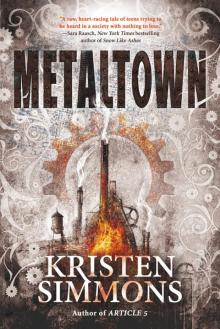 Metaltown
Metaltown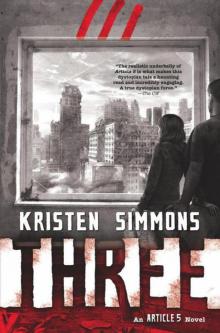 Three
Three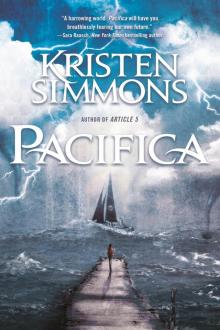 Pacifica
Pacifica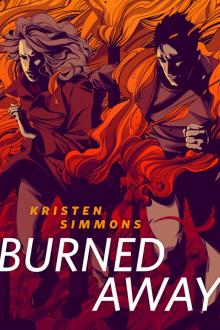 Burned Away
Burned Away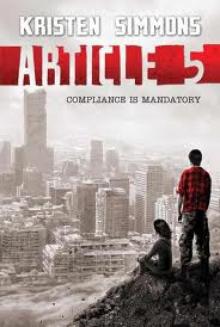 Article 5
Article 5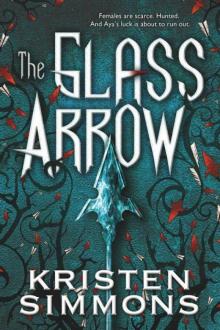 The Glass Arrow
The Glass Arrow Breaking Point
Breaking Point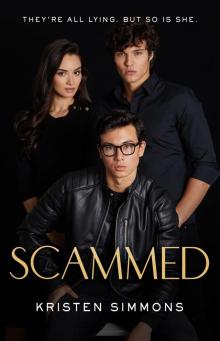 Scammed
Scammed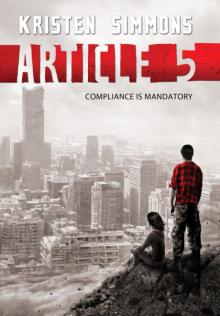 Article 5 a5-1
Article 5 a5-1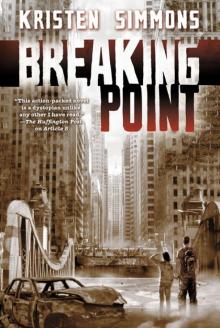 Breaking Point a5-2
Breaking Point a5-2